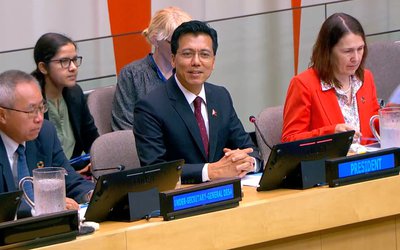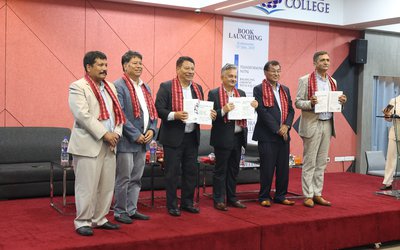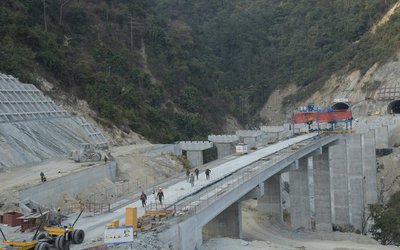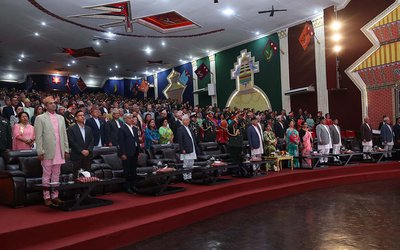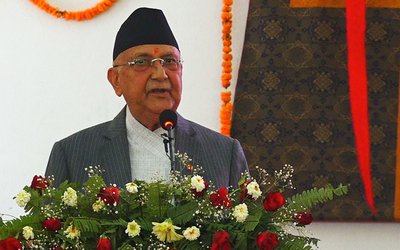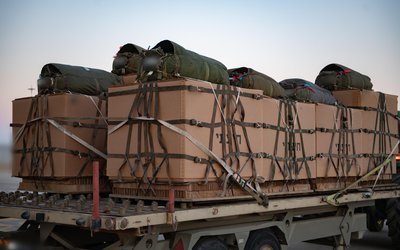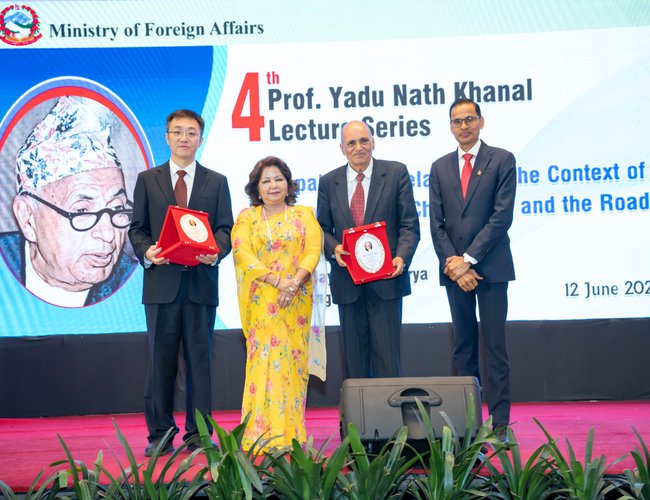
With China's economic growth as the world's second-largest economy, it is increasingly influential in global trade and power dynamics. In this context, Nepal, which shares a border of over 1400 kilometers with China, finds itself in a crucial and complex position when formulating policies.
Even though it was stated over 250 years ago, King Prithvi Narayan Shah's description of Nepal as the yam between two boulders remains highly relevant.
Nepal is situated between two major Asian powers, China to the north and India to the south, each with significant historical, cultural, and strategic interests in the country. The Pokhara International Airport is a prime example that highlights the complexities of these relationships. Despite being built with Chinese funding and expertise to enhance Nepal's infrastructure, the airport is currently underutilized due to India's refusal to grant air route permissions for international flights through its airspace. This situation underscores the challenges of Chinese infrastructure initiatives that overlook India's security concerns in the region. However, through effective diplomacy and negotiation, these issues can be resolved for the mutual benefit of all parties involved. India has consistently emphasized that its security interests in Nepal are non-negotiable," stated Professor Jayaraj Acharrya during his presentation.
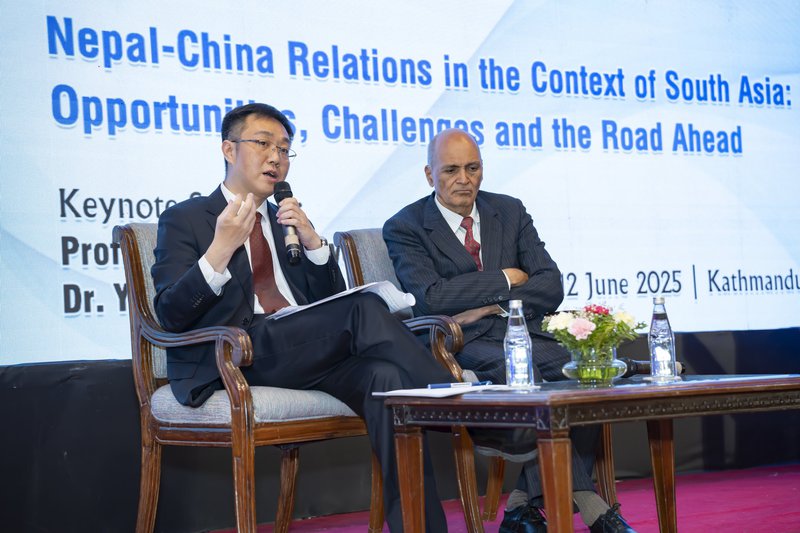
Given Nepal's shared civilization, religion, and cultural ties with India, as well as its geographical proximity, the country must carefully navigate its foreign policy to maintain a delicate balance.
Professor Acharrya, a former Permanent Representative of Nepal to the United Nations, and Dr. Yang, a Chinese scholar, provided detailed insights on the opportunities, challenges, and future prospects for enhancing bilateral relations between Nepal and China.
Dr. Yang Chenxi serves as the Director of the Department of International and Strategic Studies at the China Institute of International Studies (CIIS), a prestigious think tank affiliated with the Chinese Ministry of Foreign Affairs.
Dr. Yang earned his PhD in International Politics from Jilin University and has been a part of CIIS since 2013, holding key roles at the Xi Jinping Thought on Diplomacy Studies Centre and the Policy Planning Department of the Ministry of Foreign Affairs. His research focuses on Xi Jinping Thought on Diplomacy, China’s foreign policy, international strategic affairs, and regional diplomacy, particularly China’s relations with neighboring countries.
The recent high-level interaction on Nepal-China relations in the context of South Asia, part of the fourth edition of the Prof. Yadu Nath Kanal Lecture series, holds great significance as Nepal and China celebrate 70 years of diplomatic ties.
The discussions at the Professor Yadu Nath Kanal Lecture Series primarily centered on Nepal's relations with its two neighbors, India and China.
Foreign Minister Arzu Rana Deuba emphasized the strengthening of relations with various countries through traditions and dialogue. She highlighted the close collaboration between China and Nepal, focusing on mutual prosperity while respecting each other's sovereignty and the One-China Policy.
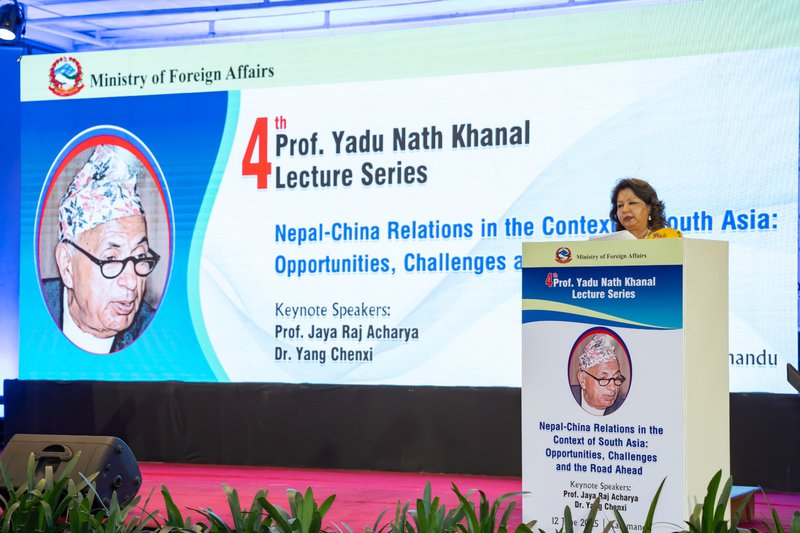
Rana noted China's significant role as a major source of foreign aid to Nepal and highlighted the potential benefits of the Belt and Road Initiative agreement signed between the two countries for Nepal's development.
The two countries have agreed to enhance air and people-to-people connections and strengthen cooperation in various other areas," she stated, highlighting China's impressive progress in poverty alleviation as a model for Nepal.
"Prof. Khanal's diplomatic practices and writings showcased his wisdom in guiding Nepal to pursue its crucial interests within the constraints of the time. He played a key role in expanding and diversifying Nepal's diplomatic relationships. His insights, drawn from extensive experience and keen observations of international politics, continue to inspire and guide subsequent generations of Nepali intellectuals and foreign policy practitioners," remarked acting Secretary Narayan Dhakal.
"His belief that Nepal must maintain clarity, consistency, credibility, and coherence in foreign policy remains as pertinent today as it was during Prof. Khanal's era."
Addressing the program's main theme, political scientist Dr. Acharya emphasized the importance of leveraging tactical diplomatic skills to benefit from China's increasing prosperity and global influence.
Likewise, Chinese foreign policy expert Professor Yang Chenqi, another keynote speaker, affirmed that Nepal's longstanding relationship with China has always been a priority. He expressed China's readiness to support Nepal in its economic development efforts and collaborate on economic growth initiatives.

This year, we have chosen Nepal-China relations as the theme, which is both timely and significant, especially as we mark the 70th anniversary of our diplomatic ties with the People’s Republic of China."
Initiated by Bharat Raj Paudyal, who is currently serving as ambassador to Canada, along with support from former chief secretary Shanker Das Bairagi, who also held the position of foreign secretary, the Lecture Series was established in honor of the late Professor Yadu Nath Khanal's remarkable contributions.
Jaya Raj Acharya stated, "At present, Nepal finds itself at a critical juncture in South Asian geopolitics, making it essential to discuss the evolving relationship between Nepal and the People’s Republic of China. With China's increasing global influence, it is important to explore how both countries can benefit from their cooperation. Additionally, we must carefully navigate the growing Chinese-Indian geopolitical rivalry and manage American strategic interests in the region."
He said that their approach remains highly relevant to Nepal even in the 21st century. Professor Khanal was keenly aware of the challenge Nepal faced in maintaining a friendly balance between the two most populous nations in the world, India and China, with differing political ideologies. Acharya said this delicate balance was evident in the Sino-Indian border clash of 1962 and subsequent incidents. He emphasized the need for Nepal to remain vigilant and objectively assess the evolving power dynamics on both sides, as it has done in the past.
He said that Nepal has always prioritized its national interests when engaging with China and other countries. It firmly believes that fostering friendships with both India and China simultaneously is in its best interest and benefits the broader regional community. Non-alignment principles advocate for promoting interdependence rather than confrontation among nations, and Nepal's geographical location necessitates interdependence between India, China, and itself.
He said that Nepal has significant potential in these areas and could benefit from Chinese technology and investment. The country still faces a shortfall in meeting its current energy needs, and there will be increasing demand in the future from sectors such as tourism, agriculture, and industry. This demand could also extend to markets in India, Bangladesh, and the Tibetan region of China.
Professor Acharya said that Nepal and China could further enhance their relationship through educational and cultural exchanges to foster better understanding and stronger people-to-people connections. Additionally, Nepal could serve as a gateway for Chinese tourists interested in spiritual or adventure tourism in Lumbini and the Himalayas.
“Due to open borders, deep cultural and religious connections, and economic ties, Nepal's decisions are closely monitored by New Delhi. When Nepal joined the Belt and Road Initiative (BRI), India expressed concerns about potential threats to its influence in the region. However, this may not necessarily be the case,” said Acharya.
The talk series, led by Kiran Shakya, a joint secretary at the Ministry of Foreign Affairs, included a question and answer session where participants sought clarification on various topics. The program highlighted the 70 years of Nepal-China relations and discussed the challenges and opportunities that lie ahead.

Keshab Poudel
Poudel is the editor of New Spotlight Magazine.
- RASUWAGADHI FLOOD: GLOF Devastation
- Jul 20, 2025
- ERC Nepal Is Focused On Expanding Distribution And Transmission To The Private Sector: ERC Chair Dr. Dhital
- Jul 06, 2025
- Colonel JP CROSS: Centenary Birthday
- Jun 23, 2025
- BEEN: Retrofitted For Green
- May 28, 2025
- GGGI has been promoting green growth in Nepal for a decade: Dr. Malle Fofana
- May 21, 2025

